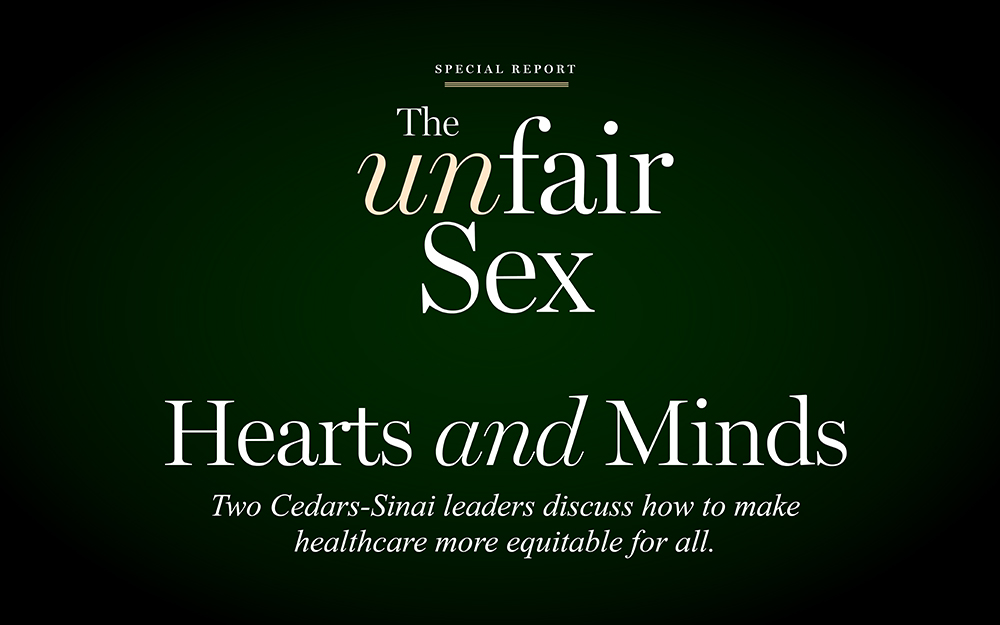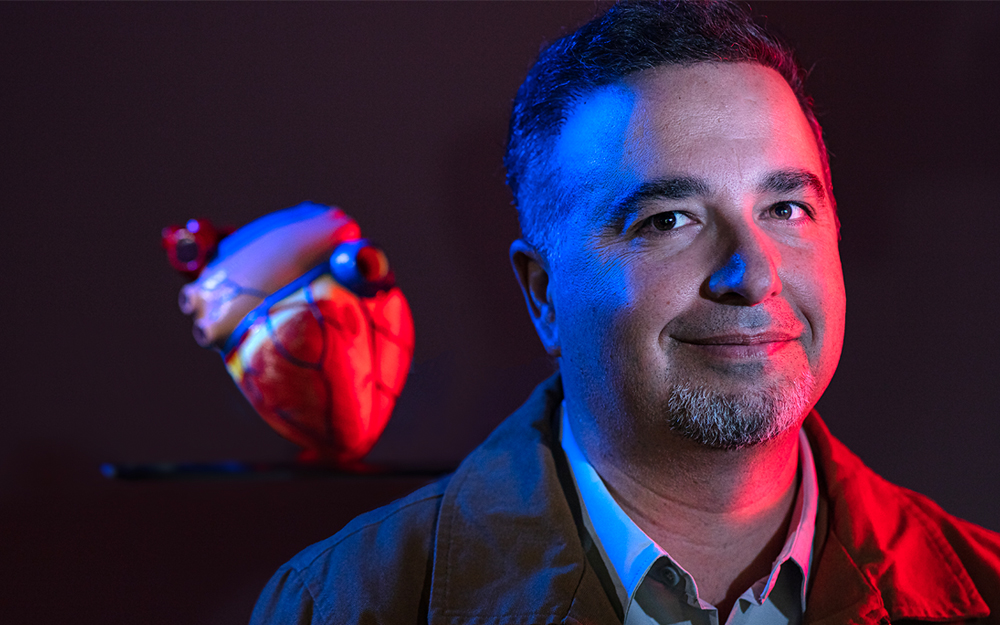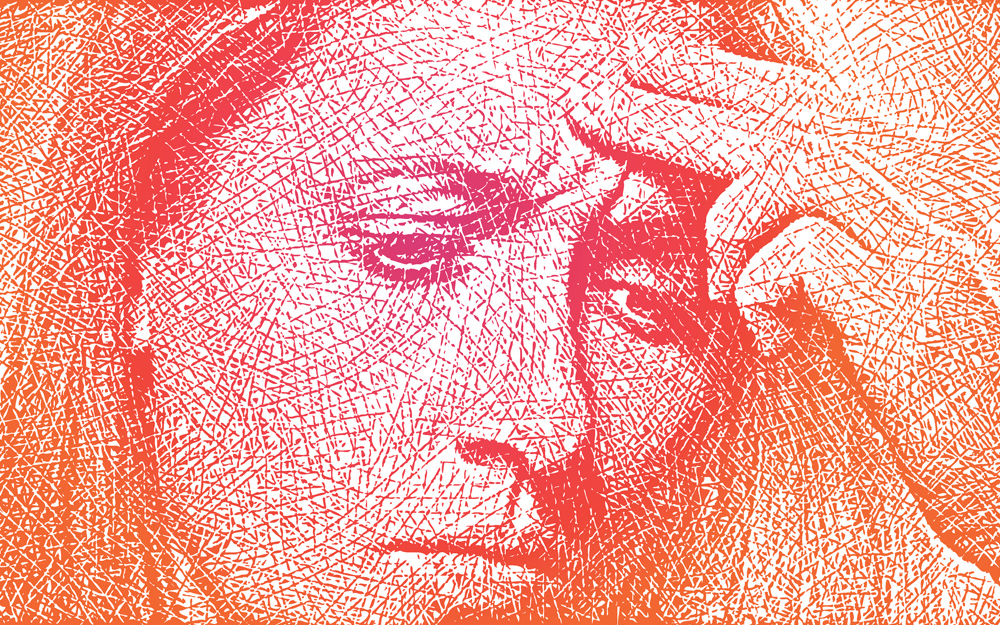Heart to Heart
Date
October 19, 2020
Credits
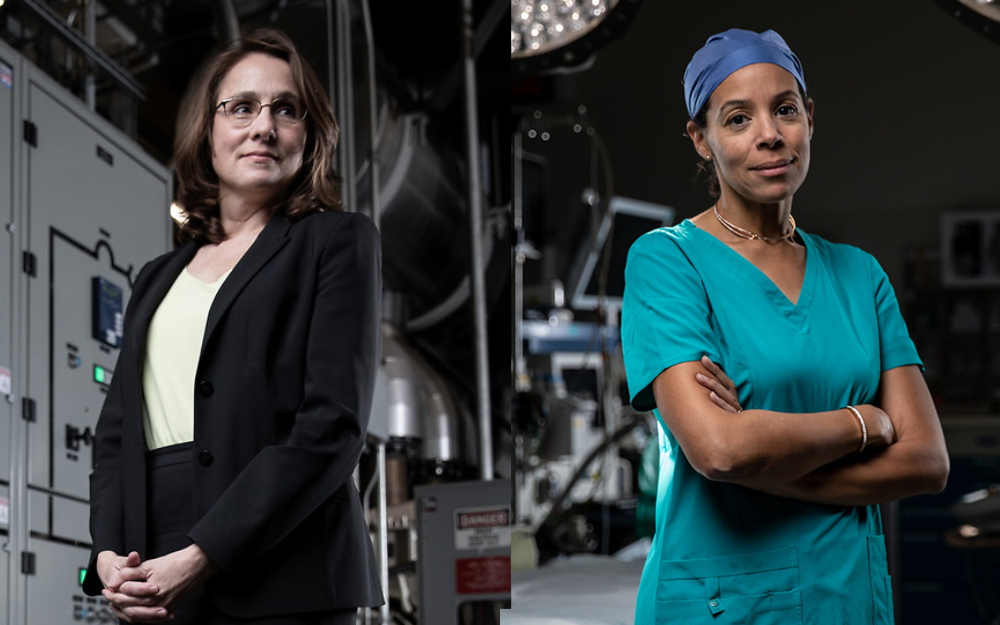
Date
October 19, 2020
Credits
Medical providers featured in this article


In Brief
{{cta-block}}
Two new experts share plans to advance Cardiology and Cardiac Surgery
The inaugural chairs of two departments in the Smidt Heart Institute were recruited for their inventive approaches to improving patient care. In turn, Christine Albert, MD, founding chair of Cardiology, and Joanna Chikwe, MD, founding chair of Cardiac Surgery, chose Smidt for its excellence: Last year, the institute was ranked No. 3 in the nation by U.S. News & World Report, and it remains home to the world’s largest and most successful heart transplant program. The new leaders are experts in their fields as well as pioneers—they join the ranks of the just 19% of female department heads at U.S. medical institutions. Here, they share their open-minded, evidence-based plans to advance patient care.

Christine Albert, MD, MPH
Founding Chair, Department of Cardiology
Lee and Harold Kapelovitz Distinguished Chair in Cardiology
What influenced you to become a doctor?
When I was 10, my mother took me to her nursing school classes when I was on school break. I was fascinated by medicine and actively participated, even though I was only a child. I became convinced I wanted to pursue a career in medicine.
What is your research focus?
I am a cardiac electrophysiologist who treats patients with heart rhythm disorders. My research focuses on how lifestyle, nutrition and genetics impact patients’ risk of developing the two most common heart rhythm disturbances, atrial fibrillation [AF] and sudden cardiac death [SCD]. AF is an abnormal heart rhythm that can lead to stroke and heart failure. SCD is due to abnormal heart rhythm disturbance from the bottom chambers of the heart. Traditionally, we treat AF and SCD with medications and procedures. However, research from our group and others demonstrates that dietary and lifestyle changes can reduce one’s risk for developing these conditions. AF is often recurrent, and lifestyles changes can reduce the frequency of episodes.
How do we make diet and lifestyle interventions work?
We are collaborating with investigators in Australia who are working on long-term behavioral interventions for patients with AF. These rather intense interventions involve a lot of visits and phone calls with patients. In this country, these interventions will likely need to be performed virtually with patients in their own homes. Over the last 20 years, we have identified several risk factors associated with AF, and the next stage is determining how we help people change those risk factors.
What else are you studying?
Our research group has recently identified genetic mutations and biomarkers that make people more prone to SCD. If we were able to screen everybody, we could potentially identify those at higher risk and intervene. For instance, we found that genetic mutations that lead to markedly elevated cholesterol levels are associated with SCD. If we could identify this risk marker early and treat the high cholesterol with a statin or other medication, we might prevent SCD.
Why is understanding sex differences important?
We don’t have sex-specific guidelines for cardiology, and sometimes that limits the way we treat patients. One size doesn’t fit all—in women, sudden cardiac arrest, an abrupt increase in heart rhythm, is more likely to be the first sign of heart disease than it is in men. And evidence is emerging that the underlying causes for sudden cardiac arrest differ between the sexes. This might mean we need a deeper study into women’s risk factors and preventive measures beyond avoiding coronary disease.
In the Newsroom: New Center's Mission: Predict, Prevent Sudden Cardiac Arrest
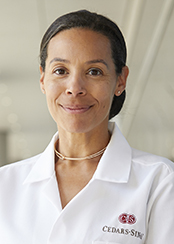
Joanna Chikwe, MD
Founding Chair, Department of Cardiac Surgery
Irina and George Schaeffer Distinguished Chair in Cardiac Surgery in honor of Alfredo Trento, MD
What influenced you to become a cardiac surgeon?
I can’t remember a time I wanted to do anything else. You have the opportunity to help patients with life-threatening conditions and to do meaningful research that can potentially affect the lives of millions more.
What is your research focus?
I focus on population health. My research aims to answer important questions that randomized clinical trials are unable to address. We study anonymized, real-world data from routine patient care, which helps us to recognize the best treatment options and understand how quality and safety can vary by hospital and across care providers. My research highlights the importance of asking your surgeon two simple questions: "How many of these procedures have you done in patients like me, and what have your results been?"
How will we ensure Cedars-Sinai continues to offer the highest level of care?
We’re advocating for a shift in how we train cardiac surgeons. In the traditional model, medical students study general surgery for several years before focusing, for less time, on hearts. We’re proposing that students instead immediately dedicate six to seven years exclusively to practicing heart surgery, including new minimally invasive approaches. I’m excited to help Cedars-Sinai lead this transformational educational approach to create experts. It’s taken the specialty a while to recognize that a lot of the tools surgeons used to need are no longer relevant, and there are huge areas of emerging knowledge they need to succeed.
What is the future of cardiac surgery?
We’re at the leading edge of a paradigm shift: We’re performing more heart surgeries, and more minimally invasively. Our robotic mitral valve repairs, which allow patients to retain their own heart valves and recover more quickly, are successful in almost 100% of patients in restoring normal life expectancy. Our program is one of the largest and most successful in the U.S. In the next few years, I expect to see Cedars-Sinai providing more complex, high-risk, high-stakes care. Older patients with more complicated issues can trust that they can receive care of the highest quality, and younger patients can immediately be guaranteed not just safety and efficacy, but also long-term, positive outcomes.
In the Newsroom: Study Reveals Best Options for Coronary Artery Disease Patients

